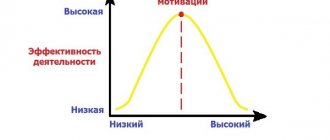Introduction
While doing my test not long before the start of the session, I wondered if it was possible to get something done by postponing things until later? After all, by postponing some things, we do others, or do we do nothing at all? There is a wonderful saying “don’t put off until tomorrow what you can do today.” Does this saying apply to the modern world and in particular to modern people? Or maybe the whole problem is motivation, because our whole life is connected with motives for one activity or another. With these questions, I decided to turn to the World Wide Web and consider them from a psychological point of view.
After going through a huge number of sites, reading all kinds of articles and aphorisms, I came to the conclusion that most modern people constantly put things off until later, and in their free time they simply do nothing, because there is no motivation, or it is very weak.
Ignorance of your desires
"What do you want?" is a simple question that is one of the first to be heard in any motivational speech. Unfortunately, most people are unable to give a clear answer.
Try asking yourself other questions: “What result do I need?”, “How should my life turn out if everything goes according to plan and even better?” The answers will help you determine your desires and the steps that need to be taken to make them come true.
It's hard to find motivation when you don't know what it's for. This rule also applies in the opposite direction. When we understand what we need and describe our goals and aspirations in detail, inspiration appears naturally.
Ask a football fan about his favorite team. Most likely, in response you will hear detailed stories about all the players, the most significant matches and other, even the smallest details. And if you ask a person about himself, he is unlikely to be able to remember what he ate for breakfast yesterday. And it's not about intelligence - it's about attention.
If we are unable to stay motivated in a certain area of life (for example, in work or personal relationships), it means that we are not paying enough attention to it and still do not understand what we want it to be.
How to fight
Set clear goals for every aspect: health, finances, self-development, work, relationships. It is better to write down your desires in a diary and make a plan on how to fulfill them. You'll see: motivation won't keep you waiting.
Motive and motivation
What is motivation, and why does it matter so much in the modern world?
Motivation - (from Latin movere) - motivation to action; a dynamic psychophysiological process that controls human behavior, determining its direction, organization, activity and stability; a person's ability to actively satisfy their needs.
Motive (lat. moveo - I move) is a material or ideal object, the achievement of which is the meaning of activity. The motive is presented to the subject in the form of specific experiences, characterized either by positive emotions from the expectation of achieving a given object, or negative ones associated with the incompleteness of the present situation. Understanding the motive requires inner work. The term “motivation” was first used by A. Schopenhauer1 in his article.
Today this term is understood differently by different scientists. For example, motivation according to V.K. Vilyunas 2 is a total system of processes responsible for motivation and activity. And K.K. Platonov 3 believes that motivation, as a mental phenomenon, is a set of motives.
As I understand it, from the above it follows that motivation is the combination of all factors (both personal and situational) that encourage a person to be active. Motive is one of the key concepts of the psychological theory of activity, developed by leading Soviet psychologists A. N. Leontiev 4 and S. L. Rubinstein5. The simplest definition of motive within the framework of this theory is: “Motive is an objectified need.” Motive is often confused with need and goal, but need is essentially an unconscious desire to eliminate discomfort, and goal is the result of conscious goal setting. For example: thirst is a need, the desire to quench thirst is a motive, and a bottle of water that a person reaches for is a goal.
This means that no activity will be successful without good motivation; activity is always motivated by certain motives. Motives are what the activity is performed for (for example, for the sake of self-affirmation, money, etc.). But why do people act this way and not otherwise? What motives make a person act?
Types of motivation
1. External motivation - caused by external circumstances. For example, a neighbor bought a new car, you become motivated to earn enough money and also buy a new car.
2. Internal motivation - not related to external circumstances, but arising within the person himself.
For example, you wanted to go on vacation to Cyprus. Moreover, your internal motivation can serve as someone else’s external motivation.
3. Positive motivation - based on positive incentives. For example, if I work well, I will receive a bonus.
4. Negative - based on negative incentives.
For example, if I am late for work, I will receive a reprimand and a fine.
5. Sustainable motivation - which is based on the needs of a person, since it does not require additional reinforcement.
6. Unstable - which constantly requires additional reinforcement.
Motivation is one of the main driving forces of human behavior and achievement of goals. Therefore, creating and maintaining motivation are valuable qualities of a successful person.
To support motivation, the method of visualizing (presenting) goals helps well. To do this, you need to clearly describe the goal - what exactly you want and what needs to be done for this. And read the compiled list as often as possible, which will motivate you.
There are also different types of motives in psychology:
- Self-affirmation motive
This motive is closely intertwined with the individual’s self-esteem, his pride and ambition. A person tries to prove to society that he is worth something, wants to be valued and respected, and strives for a certain status in society. The motive of self-affirmation is a fairly effective motivating factor, which educators, teachers, coaches and managers try to activate from an individual level from a very young age.
- Identification motive.
This motive is based on the desire to be like an idol, a hero, a certain authoritative person. The motive encourages development and work on oneself. The identification motive is especially common among youth and children who try to be like other people in certain activities.
- Power motive
It is based on the subject’s desire to gain power and the opportunity to influence the people around him. The need for power has at all times been one of the main forces driving human actions. This motive is quite strong. It allows an individual to overcome significant difficulties and make great efforts to achieve the goal.
- Procedural-substantive motives
They represent an incentive to human activity through the content and process of activity. A person loves to perform this particular activity, he shows initiative and his physical or intellectual activity. Procedural-content motives are when a person likes the content and process of the work performed.
- Self-development motive
This is one of the main motives that forces a person to work on himself and develop. Moving forward and self-development are often quite closely related to intrapersonal conflicts, but they are not violence against oneself.
- Achievement motive
The desire to achieve excellent results and high excellence in their activities. This desire usually manifests itself in the fact that the individual selects quite difficult tasks and tries to complete them. A person who is endowed with a high level of achievement motivation persistently works on himself to achieve his goal.
- Prosocial motives
These are motives associated with one’s own awareness of the social significance of the activity and responsibility to society. When such motives operate, identification of the group with the individual occurs.
- Affiliation motive
Represents the desire to maintain relationships with other people, to communicate and contact with them. The meaning of affiliation lies in the intrinsic value of communication.
- Negative motivation is an impulse that is caused by the awareness of possible troubles, punishments, and inconveniences that occur in case of failure to perform an activity.
The forms of negative sanctions that can be applied and that can actualize negative motivation are varied:
- Verbal (verbal) punishment (condemnation, reprimand, etc.);
- Material sanctions (fine, deprivation of privileges, scholarships);
- Social isolation (neglect, ignorance, rejection by the group, social ostracism);
- Deprivation of liberty;
- Physical punishment.
The needs and motives of psychology directly depend on the society surrounding a person. Needs always act only as sources of motivating power of motives. Motive and motivation in psychology are determined by the choice of direction of activity, which is determined by the actual needs, limitations and opportunities that are inherent in a certain situation. The main disadvantage of negative sanctions is the short duration of their influence: they stimulate activity (or deter undesirable actions) only for the period of their effect. Negative motivation has a stronger influence on a person, the greater his confidence in the inevitability of punishment.
Thus, negative motivation, including punishment, is a fairly strong motivational factor that can motivate a person to activity, but is not without many disadvantages and undesirable consequences.
Areas of application
To realize potential, an individual must use the right motive suitable for a specific activity:
- The work is professional fulfillment. Managers often choose fines and bonuses as incentives. Material reward affects the employee only at the initial stage. An employee gets used to monetary stimulation very quickly. When the effect wears off, and there are no new methods of motivation, performance decreases. To increase it, the employee must have the mindset to reveal his professional potential.
- Studying is gaining knowledge. The main incentive is high grades. Low scores are not only frustrating, but they also discourage you from trying to understand a complex topic. In educational activities, the main incentive should be to increase the level of knowledge. If it is not there, teaching will be perceived as punishment and the student will avoid it.
- Sport is victory over yourself. Achieving a new sports record motivates a small part of people. An athlete should want to improve his own results, and not surpass his opponents. Otherwise, he will constantly compare himself with others and he will quickly experience professional burnout.
- Personal goals - the desire for self-improvement. Having chosen to acquire a new profession or open their own business as a goal, a person should strive to unlock his potential. If the motive of activity is to prove one’s worth to someone, then the desire will disappear as soon as the external stimulus disappears.
- Advertising, entertainment - getting pleasure. Psychological comfort is related to income level and purchasing power. It is difficult to motivate a person who is not initially interested. Self-motivation methods that you can come up with for yourself will work better for him.
Motivation problems
In Russian psychology, attempts have been made to solve the problems of human motivation. However, until the mid-1960s. psychological research has focused on studying cognitive processes. The study of motivational processes in humans is, in essence, the study of the individual in his activities. The specificity of human activity is that it is always purposeful. The ability to set goals is one of the fundamental features of man as a rational being. Expressing the active side of consciousness and often determining the method and nature of a person’s actions, the goal that a person sets for himself integrates into a single whole the complex structure of regulatory processes of behavior, determines that a person performs a given act and not another. S.L. pays great attention to the relationship between motives and goals of activity. Rubinstein. It is this circumstance, in his opinion, that determines the conscious mental life of an individual and draws a single life line through it. And that is why, when studying motivation, due attention should be paid to the psychological analysis of activity.
The conditioning of the human psyche by historically established forms of activity suggests the need to consider the problem of motivation also from the perspective of the connection and interdependence of activity and consciousness. The activity of human activity is determined not only by the vital needs of the body, but is also due to the awareness of the dependence of the satisfaction of individual requests on the implementation of certain actions aimed at satisfying both the needs of the person himself and the needs of society. This emphasizes the most important role of consciousness in the activities of man as a social being in his own right. nature.
In particular, between the structure of activity and the structure of a person’s motivational sphere there are relations of isomorphism, that is, mutual correspondence, and the dynamic changes that occur with a person’s motivational sphere are based on the development of a system of activities, which is subject to objective social laws.
Thus, this concept explains the origin and dynamics of the human motivational sphere. It shows how a system of activities can change, how its hierarchy is transformed, how individual types of activities and operations arise and disappear, what changes occur with actions. In accordance with the patterns of development of activities, it is possible to derive laws that describe changes in the motivational sphere of a person, his acquisition of new needs, motives and goals.
Historical summary
Many foreign and domestic psychologists are interested in what motivates an individual to act. Ancient Greek thinkers studied motivation.
Since the 14th century, when philosophers focused on the study of hedonism as the individual's natural desire for pleasure, internal drive was seen as a natural survival mechanism. Subsequently, the unity of impulses inducing action was called motivation. This term began to be used to explain the causes of human and animal behavior.
Closer to the 20th century, motivation was studied in a number of schools. Behaviorists viewed it as the cause of bodily impulses, the body's reaction to influence. This gave rise to the stimulus-response formula, which explained any type of activity. In Freudian psychoanalysis, the basis of motivation is human attraction. Desire originates in the organ and is embodied in an irresistible attraction. Humanists understand this term as the satisfaction of instinct.
Among foreign psychologists, interest in the problem of studying motivation is inextricably linked with the study of the emotional sphere. When receiving a positive emotional stimulus, a person becomes more active and remembers more information. But there is no single theory that would explain the principle of how motivation works. Among Soviet scientists, V. Bekhterev, I. Pavlov, and I. Sechenov paid the most attention to the study of motivation. Instead of the “stimulus-response” scheme, they proposed the “signaling-reinforcement” formula. The signal irritates the senses, but action requires reinforcement—multiple repetition of the signal. Bekhterev believed that psychological processes are subject to the same reflexes as the nervous system.
At the present stage of development of psychology, the problem of studying motivation also remains relevant. Scientists have identified the main provisions that are shared by domestic and foreign researchers:
- Motivation is a socially determined formation. It may change during life.
- The motivational sphere has a motive, a goal, and emotions.
- For activity, the coincidence of motive and goal is important.
- Emotions reflect the relationship between motives and the possibility of implementation.
The study of psychological theories of motivation continues. Scientists are considering different versions of the emergence of motives, and this has made it possible to identify separate types of motivations.










